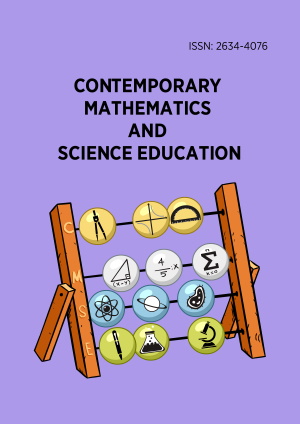Research Article
Online Learning during COVID-19 Pandemic in Rwanda: Experience of Postgraduate Students on Language of Instruction, Mathematics and Science Education
More Detail
1 University of Rwanda, College of Education, RWANDA* Corresponding Author
Contemporary Mathematics and Science Education, 2(1), January 2021, ep21009, https://doi.org/10.30935/conmaths/10788
Submitted: 22 November 2020, Published: 18 March 2021
OPEN ACCESS 4601 Views 4648 Downloads
ABSTRACT
The COVID-19 pandemic has affected human life at different levels and is still a tremendous challenge for all sectors of life without exception to education. To cope with those COVID-19 effects in education, online teaching and learning was adopted. This study throws light on online learning situation in higher education in Rwanda. The study is geared by interpretivist approach. Data were collected in a series of online individual interviews and focus group discussions with twenty master students from different subjects offered by the African Centre of Excellence for Innovative Teaching and Learning Mathematics and Science (ACEITLMS). The gathered data were analysed thematically. The study revealed communication platforms, ICT infrastructures and software, and online resources as opportunities for online learning. Despite learners’ willingness to play their part in online learning, the study further brought to light numerous challenges of learning mathematics and science such as absence of practical activities, inadequate support for structured exercises, few open resources and inadequate access to online resources. Limited internet connectivity, English proficiency coupled with insufficient collaboration among students and with facilitators were reported as limitation too. Since online mode of instruction was adopted for effective blended learning, its adjustment and adaptation are needed to grab the identified opportunities and cautiously address the identified challenges.
CITATION (APA)
Nsengimana, T., Bazimaziki, G., Nyirahabimana, A., Mushimiyimana, J. B., Mutarutinya, V., Mugabo, L. R., & Nsengimana, V. (2021). Online Learning during COVID-19 Pandemic in Rwanda: Experience of Postgraduate Students on Language of Instruction, Mathematics and Science Education. Contemporary Mathematics and Science Education, 2(1), ep21009. https://doi.org/10.30935/conmaths/10788
REFERENCES
- Adedoyin, O. B., & Soykan, E. (2020). Covid-19 pandemic and online learning: the challenges and opportunities. Interactive Learning Environments. Published online: 2 September 2020. https://doi.org/10.1080/10494820.2020.1813180
- Allen, J., Rowan, L., & Singh, P. (2020) Teaching and teacher education in the time of COVID-19. Asia-Pacific Journal of Teacher Education, 48(3), 233-236. https://doi.org/10.1080/1359866X.2020.1752051
- Arroio, A. (2020). The Value of Education In The Context Of Covid-19 Pandemic. Problems of Education in the 21st Century, 78(3), 309. https://doi.org/10.33225/pec/20.78.309
- Atmojo, A. E. P., & Nugroho, A. (2020). EFL Classes Must Go Online! Teaching Activities and Challenges during COVID-19 Pandemic in Indonesia. Register Journal, 13(1), 49-76. https://doi.org/10.18326/rgt.v13i1.49-76
- Bazimaziki, G. (2020). Challenges in using ICT Gadgets to cope with effects of COVID-19 on Education: A short survey of online teaching Literature in English. Journal of Humanities and Education Development (JHED), 2(4), 299-307. https://doi.org/10.22161/jhed.2.4.8
- Benlounissi, A. (2020). Impact of learning, exclusively online, during a pandemic. Journal of Humanities and Education Development (JHED), 2(6), 385-389. https://doi.org/10.22161/jhed.2.6.1
- Bentata, Y. (2020). COVID 2019 pandemic: a true digital revolution and birth of a new educational era, or an ephemeral phenomenon? Medical Education Online, 25(1), 1781378. https://doi.org/10.1080/10872981.2020.1781378
- Cahapay, M. B. (2020). Rethinking education in the new normal post-COVID-19 era: A curriculum studies perspective. Aquademia, 4(2), ep20018. https://doi.org/10.29333/aquademia/8227
- Crawford, J., Butler-Henderson, K., Rudolph, J., Glowatz, M., et al. (2020). COVID-19: 20 Countries’ Higher Education Intra-Period Digital Pedagogy Responses. Journal of Applied Teaching and Learning (JALT), 3(1), 9-28. https://doi.org/10.37074/jalt.2020.3.1.7
- Czerniewicz, L. (2020). What we learnt from “going online” during university shutdowns in South Africa. PhilonEdTech. Retrieved from https://philonedtech.com/what-we-learnt-from-going-online-during-university-shutdowns-in-south-africa
- Hollweck, T., & Doucet, A. (2020). Pracademics in the pandemic: pedagogies and professionalism. Journal of Professional Capital and Community, 5(3/4), 295-305. https://doi.org/10.1108/JPCC-06-2020-0038
- Hudson, P. (2009). Learning to Teach Science Using English as the Medium of Instruction. Eurasia Journal of Mathematics, Science and Technology Education, 5(2), 165-170. https://doi.org/10.12973/ejmste/75268
- Institute for Inquiry (IFI). (2015). Developing Language in the context of Science: A view from Institute for Inquiry. Exploratorium. Retrieved from www.Exploratorium.edu
- Li, L., Lin, M., Wang, X., Bao, P., & Li, Y. (2020). Preparing and responding to 2019 novel coronavirus with simulation and technology-enhanced learning for healthcare professionals: challenges and opportunities in China. BMJ Simulation and Technology Enhanced Learning, 6, 196-198. https://doi.org/10.1136/bmjstel-2020-000609
- Macaro, E., Akincioglu, M., & Han, S. (2019). English Medium of Instruction in Higher Education: Teacher perspectives on professional development and certification. International Journal of Applied Linguistics, 30(1),1-14. https://doi.org/10.1111/ijal.12272
- Singh, L., Bansal S., Bode, L., Budak, C., Chi, G.; Kawintiranon, K., Padden, C., Vanarsdall, R., Emily Vraga, E., & Wang, Y. (2020). A first look at COVID-19 information and misinformation sharing on Twitter. ArXiv. Preprint. 2020 Mar 31: arXiv:2003.13907v1.
- UNESCO (2020). Learning through radio and Television in the time of COVID-19. Retrieved from https://en.unesco.org/news/learning-through-radio-and-television-time-covid-19
- Yekin, N.A., Adigun, J.O., Ojo, O., & Andakinwole, A. K. (2020). Assessment of Adoption of E - Learning and M- Learning During COVID-19 Lockdown in Nigeria. International Academic Journal of Education and Literature, 1(1), 28-34. Retrieved from https://www.iarconsortium.org/journal-info/IAJEL
- Zu, Z. Y., Jiang, M. D., Xu, P. P., Chen, W., Ni, Q. Q., Lu, G. M., Zhang, L. J. (2020). Coronavirus Disease 2019 (COVID-19): A Perspective from China. Radiology, 296(2), E15-E25. https://doi.org/10.1148/radiol.2020200490

 The articles published in this journal are licensed under the CC-BY Creative Commons Attribution International License.
The articles published in this journal are licensed under the CC-BY Creative Commons Attribution International License.